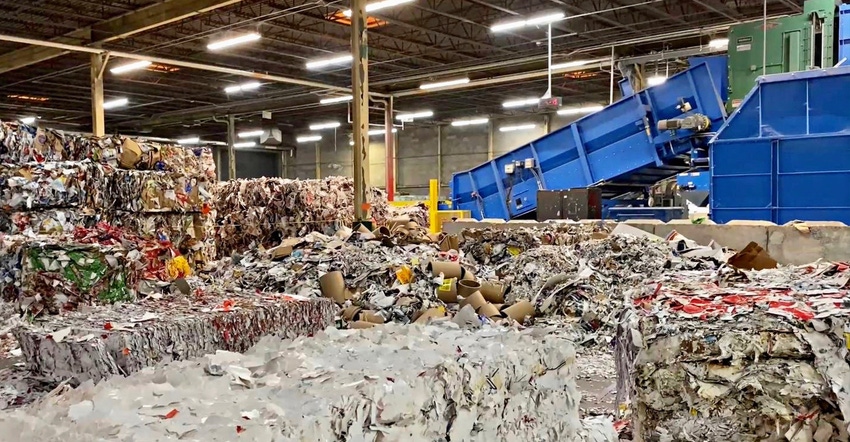
Plastic-coated, single-use food ware has long been a thorn in recyclers’ sides, though a few innovators are starting to find ways to help waste pros divert them from water bodies and landfills and pull them into a closed-loop system— including manufacturer Georgia-Pacific and partners NextGen Consortium and the Foodservice Packaging Institute (FPI).
The Atlanta-based company who, among consumer brands, makes Quilted Northern, Angel Soft, Brawny, and Dixie, has a repulping process to separate polyethylene (PE) coating from the fiber in paper cups and use the fiber to produce tissue, towel, and napkin products, even if they had food residue. What this development means is that mixed paper suppliers can accept these wasted cups in mixed paper bales where there are established end markets. The manufacturer is asking its suppliers to work with their municipalities to have them accept these PE-coated products in their residential curbside collection programs.
The material will be used at two Georgia-Pacific paper mills: one in Green Bay, Wis. and one in Muskogee, Okla., where they make tissue, towel, and napkin products primarily from recycled fiber.
“As our mixed paper suppliers (materials recovery facilities and municipalities) begin to add PE-coated cups into their residential curbside collection programs, we expect to see an increased flow of cups at our mills. In such communities we expect cups will represent 1 to three percent of an average mixed paper bale,” says John Mulcahy, Vice President of Sustainability, Georgia-Pacific.
Overall mixed paper capacity will not increase as a result of this change, but the fiber mix within the bales will change over time.
“Our focus has been on ensuring that we can effectively recover the fiber from the cups – not have the cups screened out in the process,” Mulcahy says.
The improved technology, a result of a two-year trial, has helped to address long-standing barriers.
“Prior to our investments, PE coatings, food residue, etc., would have created more challenges. However, our current equipment and processes are much better at screening PE and other residues, allowing us to recover the high-quality fiber found in cups,” says Mulcahy.
Georgia-Pacific is also collaborating with the NextGen Consortium, a global group of food and beverage companies managed by Closed Loop Partners, on another project; it entails testing cups that have replaced the PE coating altogether.
Through this separate but complementary initiative, Georgia-Pacific will conduct repulping trials using NextGen Consortium cups with new coating materials intended to be recyclable and or compostable.
NextGen is happy to see Georgia-Pacific accept paper cups in its mixed paper bales and create end markets for them.
“Not all mills can repulp cups from mixed paper bales, so this is an important development and signal to encourage other mills to accept cups, where the repulping technology permits,” says Kate Daly, managing director of the Center for the Circular Economy at Closed Loop Partners.
As far as the concept of compostable and recyclable cups to replace the PE-coated products, they will take time to scale and will co-exist with PE-coated cups in the near term.
So, notes Daly, “It’s important to create pathways for the recovery of all-fiber cups, whether PE-coated or next generation.”
Currently, just over 20 mills though the U.S. and Canada accept mixed paper bales, according to FPI, who calls out the need for more facilities to be able to accept coated paper cups for recycling as the biggest end-of-life challenge associated with them.
The trade association has formed dedicated groups of FPI members to work toward increasing the recovery of these materials and is also working with the entire supply chain to try and identify a solution that is economically viable and sustainable.
“We find that the most effective approach is to bring all the stakeholders together to work toward a common goal. So, we work extensively with MRFs, mills, converters, brands, and communities to bring everyone to the table and increase paper cup recycling,” says Natha Dempsey, President of FPI.
Dempsey pointed to the value of Georgia-Pacific’s similar networking approach, as well as its business model.
“They are in a unique position to help address the challenge of increased recovery and recycling of foodservice packaging, in that they are both a producer of paper-based foodservice packaging and a consumer of recovered fiber in the manufacture of recycled tissue and packaging products. G-P leveraged their relationships to understand material flows, and conducted recycling trials that demonstrated that effective recycling of paper cups is possible,” says Dempsey.
As NextGen Consortium members, McDonald’s and Starbucks have stood behind Georgia-Pacific’s recovery efforts.
“We are taking a meaningful step forward with Georgia-Pacific toward our goal of reducing paper cup waste. We’re excited by this progress and look forward to our continued partnership with organizations that support our vision of a resource-positive future,” Michael Kobori, Chief Sustainability Officer at Starbucks said in a statement.
Marion Gross, Chief Supply Chain Officer, North America, McDonald’s, echoed this mindset: “Recovering, recycling, and reusing the valuable materials in our cups is an important part of our sustainability ambition and our work with the NextGen Consortium. By accepting and reprocessing single-use cups, Georgia-Pacific is not only enhancing recycling pathways but also generating a supply pipeline of recycled content critical to positively impacting the environment and achieving our goals,” says Gross.
About the Author(s)
You May Also Like




